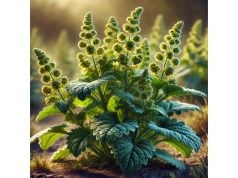
Dewberries are wild and cultivated bramble fruits in the Rubus genus, closely related to blackberries and raspberries. If you have ever picked low-growing, trailing “blackberries” that ripen early and taste slightly more tart, you have likely met a dewberry. Beyond their familiar flavor, dewberries bring a useful mix of fiber, vitamin C, manganese, and deeply colored polyphenols such as anthocyanins and ellagitannins. Traditional plant use also includes dewberry leaves as an astringent tea, mainly for short-term digestive upsets and simple mouth and throat rinses.
The most practical value of dewberry is that it can be both food and gentle herbal support: a nutrient-dense fruit for regular eating, and a leaf tea used carefully when astringency is the goal. This guide explains what dewberry is, what is inside it, what benefits are realistic, how to use it, dosage ranges by form, and the safety details that matter.
Key Facts
- Regular dewberry intake can support digestive regularity and cardiometabolic health markers through fiber and polyphenols.
- Leaf tea is astringent and can aggravate constipation or reduce iron absorption if used too often.
- A practical food range is 75 to 150 g fresh dewberries per day, or 1/2 to 1 cup most days in season.
- Avoid harvesting from polluted roadsides and sprayed areas because bramble fruits and leaves can carry residues.
- People with berry allergies, severe reflux or ulcers, or iron-deficiency anemia should avoid medicinal-strength leaf tea unless a clinician advises it.
Table of Contents
- What is dewberry and what is in it
- Key ingredients and medicinal properties
- Dewberry benefits you can expect
- How to use dewberry at home
- How much dewberry per day
- Side effects interactions and who should avoid it
- What the evidence actually says
What is dewberry and what is in it
“Dewberry” is a common-name umbrella, not a single plant. It usually refers to trailing or low-growing bramble species in the Rubus genus, including species often grouped with blackberries. In North America, dewberries commonly include trailing species such as Rubus trivialis and Rubus ursinus (names and local species vary by region). In parts of Europe, “European dewberry” may refer to Rubus caesius, which has a bluish bloom on the fruit. Because dewberry is written as Rubus spp., it is best treated as a category of closely related edible bramble berries rather than one standardized herb.
The everyday confusion is understandable: dewberries look like small blackberries, and they are often harvested from similar brambles. A simple field distinction is growth habit and timing. Dewberries tend to trail or sprawl close to the ground and often ripen earlier. Their fruits can be slightly smaller, sometimes tarter, and can have a softer structure depending on species and growing conditions. These differences matter for use because ripeness affects both taste and polyphenol profile, and softer berries require gentler handling and faster use.
When people talk about dewberry as a “herb,” they may mean either the fruit or the leaf. These are different tools.
- Fruit is mainly a food: it provides fiber, water, organic acids, and a spectrum of pigments and phenolics that behave like “plant signals” for the body.
- Leaves are mainly astringent: they contain tannins and related compounds that can tighten tissues and reduce excess secretions, which is why leaf teas are traditionally used for short-term, mild digestive looseness or as a mouth rinse.
A practical way to think about dewberry is “two preparations, two goals.” The fruit is for steady nourishment and metabolic support over time, while the leaf tea is for targeted, short-term astringency. Mixing those roles leads to common mistakes, such as using leaf tea daily for “antioxidants” and then wondering why constipation or stomach irritation appears.
Sourcing also matters more than most people assume. Wild dewberries can be remarkably clean in remote areas, but brambles near roadsides, sprayed fields, or industrial edges can collect dust, exhaust residues, and herbicide drift. Because dewberries are often foraged, safe harvesting practices are part of responsible use.
In short, dewberry is best approached as a nutrient-dense bramble fruit with a traditional astringent leaf option. Understanding which part you are using and why is the first step toward benefits that are realistic and risks that stay low.
Key ingredients and medicinal properties
Dewberry’s “active ingredients” are not one magic compound. Like other Rubus berries, it offers a layered chemistry: nutrients that support basic physiology, and polyphenols that influence oxidative stress, inflammation signaling, and vascular function. The leaf adds a more astringent profile that fits traditional, short-term use.
Here are the most meaningful ingredient groups and what they tend to do in the body.
Anthocyanins and other berry pigments
The deep purple to near-black color of ripe dewberries comes largely from anthocyanins, often dominated by cyanidin forms in related blackberries. Anthocyanins are associated with antioxidant capacity in the lab, but their more interesting role in humans is signaling: they may influence endothelial function (how blood vessels respond), inflammatory markers, and glucose handling. Their effects are generally modest and depend on dose, overall diet, and gut metabolism.
Ellagitannins, ellagic acid, and gut-derived urolithins
Many Rubus berries contain ellagitannins and ellagic acid, compounds that can be transformed by the gut microbiome into urolithins. This matters because urolithins are often more absorbable than the parent compounds. The practical insight is that two people can eat the same berry serving and produce different metabolite patterns, which may partly explain why berry benefits feel stronger for some people than others.
Fiber and seed structure
Dewberries provide both soluble and insoluble fiber. Soluble fiber helps slow digestion and can support steadier post-meal glucose responses. Insoluble fiber supports stool bulk and transit. The seeds also contribute to the texture and to fiber intake. For most people, that is a digestive advantage; for a small minority with very sensitive guts, seeds can be irritating if eaten in large amounts quickly.
Vitamin C, manganese, and supportive micronutrients
Like other bramble berries, dewberries typically contribute vitamin C and manganese, plus smaller amounts of folate, vitamin K, magnesium, and potassium. Vitamin C supports collagen formation and immune function, while manganese is involved in antioxidant enzymes and connective tissue metabolism. These nutrients do not “treat” a disease by themselves, but they strengthen baseline resilience, especially when fruit is eaten regularly rather than occasionally.
Leaf tannins and astringent compounds
Dewberry leaves contain tannins and related phenolics that create an astringent mouthfeel. Astringency is a medicinal property: it can reduce mild excess secretions and support tissue tone. That is why leaf teas are used short-term for occasional loose stools or as a gargle for minor mouth irritation. The tradeoff is that tannins can bind to minerals and reduce absorption, especially iron, if used too often or too strongly.
The main takeaway is that dewberry fruit works through nourishment and gentle signaling over time, while dewberry leaf works through astringency and short-term local effects. When you match the preparation to the goal, dewberry becomes a practical, low-drama plant ally rather than a confusing supplement experiment.
Dewberry benefits you can expect
Most dewberry benefits are best described as “supportive and cumulative.” This is a food-forward plant: the fruit shines when it is eaten regularly in realistic servings, and the leaf is most useful when it is used briefly and for a clear reason.
1) Digestive regularity and gut comfort
The most dependable benefit of dewberry fruit is fiber-driven digestive support. If you eat dewberries in place of low-fiber snacks, you will often notice better stool regularity and less “swingy” appetite. For many people, the sweet-tart profile also makes it easier to eat fruit consistently, which is a practical advantage in itself.
A separate digestive use comes from the leaf. A mild, short course of leaf tea can be helpful for occasional loose stools when dehydration, fever, blood in stool, or severe pain are not present. Think of it as a gentle “tightening” tea rather than a daily tonic.
2) Cardiometabolic support
Bramble berries are commonly studied for effects on vascular function, oxidative stress balance, and post-meal glucose responses. In real life, this often translates to small improvements that add up: better snack quality, lower overall sugar load, and better satiety. The berries themselves are not a medication, but replacing refined desserts with dewberries a few times per week can be meaningful over months.
3) Inflammation and recovery context
Polyphenols such as anthocyanins and ellagitannin derivatives are often discussed as anti-inflammatory. The realistic expectation is not a dramatic “painkiller effect,” but a gentle nudge in the direction of better recovery, especially when the rest of the diet is already supportive. People often notice the biggest difference when berries are part of a consistent pattern: fruits, vegetables, legumes, and adequate protein, rather than a single “superfood” added to an otherwise low-quality diet.
4) Skin and connective tissue nutrition
Vitamin C and polyphenols support collagen formation and help defend skin lipids from oxidative stress. In practice, this is not a quick cosmetic effect. It is more like “nutritional scaffolding” that supports skin and connective tissue over time, particularly when fruit intake replaces nutrient-poor snacks.
5) Practical advantages that matter
Dewberries are often free or low-cost when foraged responsibly, and they freeze well, which makes it easier to keep them in your routine. Freezing can preserve much of the berry’s polyphenol content, and it turns a short season into a longer habit. That convenience is a health advantage because consistency is what makes food-based benefits real.
The most important boundary is this: dewberry is not a substitute for medical evaluation. If you are using leaf tea for repeated digestive issues, or using berries to “fix” blood sugar problems without addressing the bigger plan, you are likely to be disappointed. Dewberry works best as a supportive, food-first tool that fits a broader pattern of care.
How to use dewberry at home
Dewberry is unusually flexible because the fruit and leaf can be used in different ways. The key is choosing a method that matches your goal and your tolerance.
Using dewberry fruit
For most people, the best “medicinal” use of dewberry is simply eating it as fruit. A few practical methods improve both enjoyment and consistency:
- Fresh, fully ripe berries: Choose berries that come off the plant easily. Underripe bramble berries are often harsh and can irritate sensitive stomachs.
- Frozen berries: Freeze in a single layer first, then store in a bag. This reduces clumping and preserves texture.
- Low-sugar pairings: Add to plain yogurt, oats, chia pudding, or a smoothie without adding extra sweeteners.
- Quick compote: Simmer briefly with a splash of water and cinnamon, then cool. Use it as a topping rather than a syrup.
If seeds bother you, strain a portion into a sauce or blend and sieve for a smoother texture. This keeps the polyphenols while reducing the seed load.
Using dewberry leaves
Leaf use is best approached like a traditional herbal astringent, not an everyday beverage.
Simple leaf infusion (mild astringent tea)
- Use dried leaves from a clean source.
- Steep in hot water, covered, for 10 to 15 minutes.
- Start with a small serving to test tolerance.
Mouth rinse or gargle (non-swallowing use)
A cooled leaf infusion can be used as a gentle rinse for occasional mouth irritation. Do not use on open wounds in the mouth without professional guidance, and stop if it stings or worsens irritation.
Safety-focused harvesting and handling
Because dewberries are often foraged, handling is part of safe use:
- Harvest away from busy roads, sprayed fields, and industrial edges.
- Rinse gently and dry well to reduce mold risk in storage.
- Refrigerate fresh berries and use within a few days, or freeze promptly.
- If you dry leaves, dry them fully and store in a sealed container away from moisture.
Common mistakes to avoid
- Using strong leaf tea daily “for antioxidants,” then developing constipation or stomach upset.
- Harvesting from contaminated sites because the berries look “wild and natural.”
- Eating large amounts suddenly if you are not used to high-fiber fruit.
- Treating leaf tea as a substitute for evaluation when diarrhea is persistent or severe.
Dewberry works best when you keep it simple: fruit as food, leaf as short-term astringent, and both from clean sources.
How much dewberry per day
Dewberry dosing depends on whether you are using the fruit as food or the leaf as an herbal preparation. Food doses can be larger and more flexible. Leaf doses should be smaller, time-limited, and goal-specific.
Fruit dosage for everyday health
A practical, evidence-aligned food range for most adults is:
- 75 to 150 g fresh dewberries per day, or
- 1/2 to 1 cup daily during the season
If you are using dewberries as part of a cardiometabolic-support pattern, consistency matters more than a perfect number. Many people do well with 1/2 cup most days or 1 cup 3 to 5 times per week, especially when berries replace refined snacks or desserts.
If you are increasing fiber intake, ramp up gradually:
- Start with 1/4 cup daily for 3 to 4 days.
- Increase to 1/2 cup daily if tolerated.
- Move toward 1 cup on active days or in peak season if your gut feels comfortable.
Drink adequate water when increasing fiber. This is not a supplement rule, it is a physiology rule.
Leaf tea dosage for short-term astringency
Because dewberry leaf use is not standardized across all species, stay conservative:
- 1 to 2 g dried leaf in 240 mL hot water
- Steep 10 to 15 minutes, covered
- Up to 2 to 3 times daily for no more than 3 to 5 days
This is most appropriate for occasional loose stools without red-flag symptoms. If symptoms persist beyond a few days, recur frequently, or come with fever, dehydration, blood in stool, or significant pain, stop self-treatment and get evaluated.
Timing and best practices
- Fruit: Any time of day. Many people tolerate berries best with meals or paired with protein, especially if they are sensitive to acidic fruits.
- Leaf tea: Often taken between meals for astringent effect, but people with sensitive stomachs may do better after a small snack.
Variables that change your ideal amount
- Gut sensitivity: Seeds and acidity can be irritating in large servings for some people.
- Blood sugar goals: Pair berries with protein or fat if you notice cravings after fruit alone.
- Iron status: If you are iron-deficient, avoid frequent leaf tea use and separate any leaf tea from iron supplements by at least 2 hours.
The safest approach is to treat dewberry fruit as a regular food serving and dewberry leaf as a short course. That split keeps benefits realistic and side effects uncommon.
Side effects interactions and who should avoid it
Dewberry fruit is generally well tolerated as a food, but “generally safe” is not the same as “no cautions.” Most issues come from allergies, contaminated harvesting, or using leaf tea too strongly or too often.
Possible side effects from the fruit
- Digestive discomfort: Large servings can cause bloating or loose stools in people not used to high-fiber fruit.
- Acid sensitivity: The sweet-tart acids may aggravate reflux in some people, especially on an empty stomach.
- Allergic reactions: Anyone with a history of berry allergies should avoid dewberry and treat first exposure cautiously.
Possible side effects from the leaf
Leaf preparations are more likely to cause side effects than the fruit because they are astringent and tannin-rich.
- Constipation or cramping if used when stools are already firm
- Stomach irritation or nausea with strong infusions
- Reduced iron absorption if used frequently, especially near iron-rich meals or iron supplements
If you notice worsening constipation, black stools that are not explained by foods, persistent abdominal pain, or signs of dehydration, stop leaf tea and seek care.
Interactions to consider
Dewberry fruit as a food is unlikely to cause significant interactions for most people, but two practical cautions are worth noting:
- Warfarin and vitamin K consistency: Bramble berries can contain vitamin K. The safest approach is not avoidance but consistency in your overall diet if you are anticoagulated.
- Iron supplements and tannins: If you use leaf tea, separate it from iron supplements by at least 2 hours to reduce binding effects.
Who should avoid medicinal use
These groups should avoid dewberry leaf tea unless a clinician advises it:
- Pregnant or breastfeeding people (food servings of berries are usually fine, but medicinal-strength leaf use is not well standardized for dewberry species)
- Children under 12, unless supervised by a qualified professional
- People with iron-deficiency anemia or a history of very low ferritin
- People with chronic constipation, severe reflux, or known ulcers
- Anyone with recurrent diarrhea, inflammatory bowel disease flares, or unexplained GI symptoms
Harvesting and contamination risks
For foragers, the biggest safety issue is location. Avoid harvesting from:
- Road shoulders and high-traffic edges
- Areas with visible spraying or agricultural drift
- Urban drainage channels and industrial perimeters
Wash berries, inspect for mold, and refrigerate promptly. If you dry leaves, dry them completely to prevent mold growth.
The safest way to use dewberry is simple: eat the fruit in normal servings, keep leaf tea short-term and conservative, and treat harvesting location as a safety decision, not an afterthought.
What the evidence actually says
Dewberry-specific clinical research is limited because “dewberry” covers multiple Rubus species and because most human studies focus on blackberries, raspberries, or purified anthocyanins rather than dewberries by name. Still, the broader Rubus and anthocyanin evidence can help you set realistic expectations.
What is strongest
- Nutritional value and phytochemical richness are well supported. Across Rubus berries, there is consistent evidence of meaningful fiber, vitamin C, and polyphenol content, including anthocyanins and ellagitannin-related compounds. This supports dewberry as a smart fruit choice, especially when it replaces refined snacks.
- Anthocyanins show measurable, modest effects in supplementation trials. Systematic reviews and meta-analyses of anthocyanin interventions often report small improvements in markers related to inflammation or cardiometabolic health in certain populations. This is encouraging, but it does not translate into a guarantee that a bowl of berries will “treat” a condition. Supplements are standardized; fruit is variable and comes with fiber, acids, and other compounds.
- Ellagitannin metabolism depends on the microbiome. Research on ellagitannins and urolithin-related outcomes suggests that the downstream metabolites may be more biologically active and more absorbable than the parent compounds. A practical implication is variability: the same berry habit can produce different internal exposures in different people.
Where the gaps are
- Species specificity: Dewberry as Rubus spp. is too broad for a single clinical claim. Even within blackberries, cultivars vary in polyphenol content.
- Dose standardization: Food-based studies vary in serving size, duration, and dietary context. This makes it difficult to name one “therapeutic dose” of dewberries.
- Outcome strength: Many berry outcomes are modest, and most are best viewed as risk-factor support rather than disease treatment.
How to use the evidence wisely
If you want evidence-aligned benefits, focus on what berries do best:
- Eat dewberries consistently in food servings.
- Use them to displace refined sweets rather than adding them on top of a high-sugar pattern.
- Pair them with protein if you want steadier appetite and less snacking.
- Treat leaf tea as an astringent tool for short-term use, not a daily wellness drink.
The most honest conclusion is also the most useful one: dewberry is a high-value bramble fruit with plausible and partially supported cardiometabolic and anti-inflammatory benefits, and a traditional leaf use that should remain conservative and time-limited. When you approach it that way, the plant fits real life and the evidence at the same time.
References
- Blackberries and Mulberries: Berries with Significant Health-Promoting Properties 2023 (Review)
- Review of the Report on the Nutritional and Health-Promoting Values of Species of the Rubus L. Genus 2024 (Review)
- Effects of anthocyanin supplementation in diet on glycemic and related cardiovascular biomarkers in patients with type 2 diabetes: a systematic review and meta-analysis of randomized controlled trials 2023 (Systematic Review and Meta-Analysis)
- Anthocyanin Supplementation and Inflammation: A Systematic Review and Meta‐Analysis of IL‐8, IL‐10, IL‐18, IFN‐γ, and Resistin in Healthy, Overweight, and Obese Populations 2026 (Systematic Review and Meta-Analysis)
- FoodData Central 2026 (Database)
Disclaimer
This article is for educational purposes only and does not provide medical advice, diagnosis, or treatment. Dewberry fruit is typically consumed as food, but individual tolerance varies, and foraged plants can be contaminated depending on location. Dewberry leaf tea is a traditional astringent preparation and should be used conservatively and short-term only. If you are pregnant, breastfeeding, have a chronic condition, take prescription medications, or have persistent or severe digestive symptoms, consult a qualified clinician before using dewberry medicinally.
If you found this article useful, please share it on Facebook, X, or your preferred platform so others can make safer, better-informed choices.






